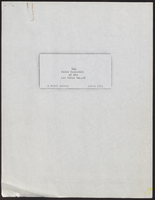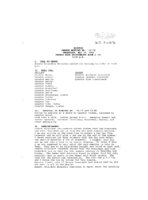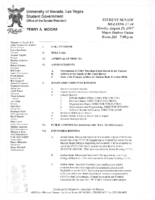Search the Special Collections and Archives Portal
Search Results

Transcript of interview with Elton Garrett by Alan Gurwitz, March 1, 1981
Date
Archival Collection
Description
On March 1, 1981, Alan Gurwitz interviewed Elton Garrett (born 1902 in St. Joseph, Missouri) about his experiences in Southern Nevada and more specifically his work in Boulder City. Garrett first talks about the development of Boulder City from its inception in 1931 and how it has grown throughout nearly fifty years. He also discusses his work in journalism for the Boulder City Journal, the building of Boulder Dam, and atomic testing at the Nevada Test Site. The second part of the interview involves a discussion of the founders of Nevada Southern University, Garrett’s work on legislative committees, and his work as a schoolteacher and school principal. The interview concludes with Garrett’s thoughts on the future of Boulder City and its continued growth.
Text

Transcript of interview with Juanita Kilburg by Vincente C. Camacho, March 7, 1981
Date
Archival Collection
Description
On March 7, 1981, Vicente C. Camacho interviewed accounting clerk, Juanita Kilburg (born September 25th, 1923 in Los Angeles, California) on the second floor of the UNLV Dickinson Library. Kilburg explains how her family first moved to Southern Nevada and her father’s ties to the railroad. She then goes on to explain the growth of the military and Nellis Air Force Base. The interview concludes with a discussion on her work with the American Legion service organization.
Text

The water resources of the Las Vegas Valley: a brief survey, March 27, 1931
Date
Archival Collection
Description
Overview of the water resources in the Las Vegas Valley, includes maps
Text

Transcript of interview with Russell Grater by Frederick Dougan, February 10, 1977
Date
Archival Collection
Description
On February 10, 1977, Frederick Dougan interviewed Russell Grater (born 1907 in Lebanon, Indiana) about his career in the U.S. National Park Service. Grater first talks about his move to the Southern Nevada area and his work that impacted the Hoover Dam project. He then talks about the town of St. Thomas, Nevada, the Lost City, and the activities of tourists. Grater also talks about his work in excavation, the indigenous American Indian tribes of the area, findings on petroglyphs, and the types of wildlife that were found in the area. He later talks about findings related to fossils, gold mining, the effects of World War II on the dam project, and vegetation in the area.
Text

Transcript of interview with William Hanson by Randy Martin, March 5, 1979
Date
Archival Collection
Description
On March 5, 1979, Randy Martin interviewed William George Hanson (born 1937 in Huntington Park, California) in his home at 4506 West Del Oro Drive, Las Vegas, Nevada. The interview begins with Hanson providing a brief overview of the different addresses that he has lived at as well as his personal background and interests. Hanson describes his experience playing on a racially integrated youth baseball team and his perception of the western side of Las Vegas; Hanson later recalls a rumor he had overheard about Howard Hughes. The two then discuss recreation in Las Vegas; specifically, jazz entertainers that would perform at lounges on the Strip, and swimming in hotel pools. The interview concludes with Mr. Hanson describing a pizzeria that he used to frequent in the 1950s.
Text

Transcript of interview with Elbert Edwards by Ronald Johns, 1972
Date
Archival Collection
Description
On an unspecified date in 1972, Ronald Johns interviewed Elbert Edwards (born 1907 in Panaca, Nevada) about his life in Southern Nevada. Edwards first talks about his family’s move to Panaca, Nevada in 1864 and talks briefly about his work in Las Vegas public schools during the Great Depression. The two also discuss the Boulder Dam, Edwards’ involvement in politics, and mining in Nevada. He also talks about the cost to build a home in Las Vegas in 1936, the development of Boulder City, and the way of life in the small town of Panaca. The interview then moves on to the topics of the early territorial boundaries of Nevada and Utah, the atomic testing at the Nevada Test Site, and early water sources in Southern Nevada.
Text

Transcript of interview with Lamar Foremaster by Gregory Hall, February 14, 1979
Date
Archival Collection
Description
On February 14, 1979, Gregory M. Hall interviewed his coworker, LaMar Foremaster (born May 9th, 1907 in Alamo, Nevada) at his place of business, Anderson Dairy, in Las Vegas, Nevada. This interview covers the changes, growth, and development of Southern Nevada from 1907 to 1979. During the interview LaMar discusses the Old Ranch, Boulder Dam, Hoover Dam, Fremont Street and the Strip. He also talks about his religious ties to the Mormon Church and his political activities in Las Vegas.
Text

Jack K. Leavitt interview, February 28, 1979: transcript
Date
Archival Collection
Description
On February 28, 1979, collector Alick Dziabczenko interviewed Jack Leavitt in Las Vegas, Nevada. In this interview Mr. Leavitt talks about his childhood in Las Vegas. He also talks about his family life and his career in the city, as well as some of the many changes he has seen in Las Vegas.
Text

Meeting minutes for Consolidated Student Senate University of Nevada, Las Vegas, May 19, 1993
Date
Archival Collection
Description
Text

Meeting minutes for Consolidated Student Senate University of Nevada, Las Vegas, August 25, 1997
Date
Archival Collection
Description
Text
